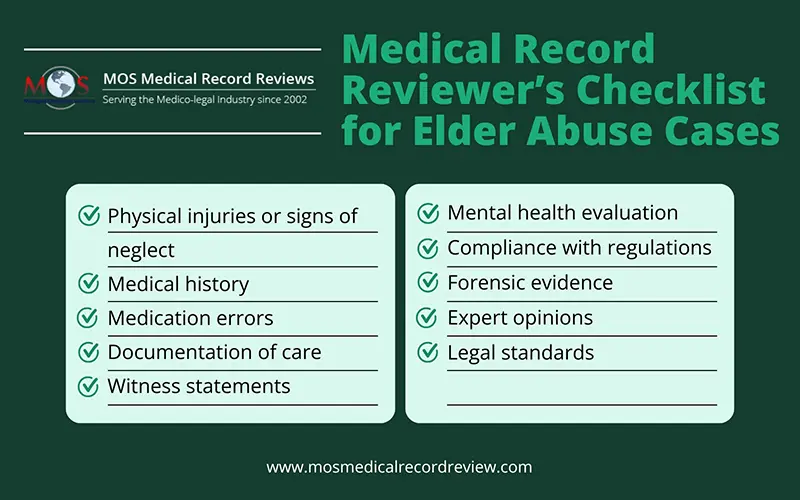An elder abuse case involves an injury, and therefore just as in any personal injury case, it calls for the review of the injured person’s medical records and the use of medical record retrieval services. So, what constitutes elder abuse? It signifies any knowing, negligent or intentional act by a caregiver or any other person, which results in harm or a serious risk of harm to a dependent adult. In nursing home negligence cases, medical records constitute key evidence. They provide a comprehensive account of the elderly person’s medical history, treatment provided and care given. Thereby, you get to know whether the nursing home or healthcare facility met their duty of care. This is necessary to hold the agency where the abuse occurred accountable and obtain due compensation for the suffering inflicted on the patient. Medical peer review becomes a very significant process in this regard by providing details of the injury and its seriousness.
MOS Medical Record Reviews is your trusted provider of medical chart review solutions.
Different Types of Elder Abuse
The types of elder abuse can be:
Physical: This involves threatening to inflict or actually inflicting an injury or physical pain on an elderly person, or not providing them with their basic needs.
Emotional: Here distress, mental pain, or anguish is inflicted on the vulnerable person through physical or verbal actions.
Sexual: Any kind of non-consensual sexual contact.
Exploitation: Misuse or concealment of funds or assets or illegally securing an elder’s funds, property and assets.
Neglect: Refusal or failing to provide healthcare, food, shelter, and protection to a weak elderly person.
Self neglect: This signifies the behavior of the elderly person who threatens his/her own safety and health. They deprive themselves of the adequate amount of food, water, shelter, clothing, personal cleanliness, necessary medications, and safety precautions.
Abandonment: In this type of abuse, the elderly person is deserted by people who are responsible for their care and custody.
How Medical Records and Medical Record Review Are Important
In most elder abuse cases, some injury or illness may be involved, which highlights the significance of medical records. These cases can be civil or criminal cases, and involve concerns such as pressure ulcers and the failure on the part of the caregiver to turn the patient to prevent such wounds. In other cases, it may be injuries caused by slip and fall and the important question is whether the staff had ensured efficient safety measures to prevent such injuries from happening.
Medical chart review is important because it helps determine whether / how the patient’s medical conditions may have contributed to their conditions. It also helps decide whether there were any breaches in the standard of care. The medical records can provide strong evidence of abuse and negligence towards the elderly person. For instance, this could be available in the form of data pertaining to unexplained injuries, bedsores, sudden changes in the person’s health status and so on.
These records can also reveal instances where medical interventions were delayed or improperly administered. In cases of abuse, medical records may document physical injuries that are inconsistent with the explanations provided by the nursing home staff.
Medical records can also highlight patterns of neglect over time. For instance, if a resident repeatedly experiences the same type of injury or medical issue, it may suggest a lack of adequate care or supervision. Legal professionals can use these patterns to establish a history of negligence, strengthening the case against the facility. Moreover, discrepancies between staff notes and the resident’s actual medical condition can indicate falsification of records, which is a serious offense and can significantly impact the outcome of a negligence case.
So, what are the important medical records that need to be retrieved so that a legal case chronology can be prepared for the attorney’s use? These include, lab tests and results, physicians’ notes, and many others.
Prosecuting attorneys necessarily need the hospitalization records and emergency department records when the abuse was first identified. Diagnostic records, physician notes, records of any emergency medical services provided or ambulance records, lab tests and radiographic tests done during the hospitalization, medical records with descriptions of the wounds and their size, social work notes, psychiatric evaluations done during the hospitalization, medical photos, medication and treatment administration records, are all very significant from the point of view of an elder abuse case.
Recent studies show that radiologists and radiology records could play an important part in elder abuse detection. However, it is recommended that ongoing research must continue to pursue or identify definitive imaging proof of elder abuse. A large number of cases have to be studied to identify specific injury or fracture patterns that help distinguish abusive injuries from typical geriatric pathologies.
The medical records many months/years prior to when the abuse was identified and those months/years after the abuse was detected may also be helpful. Nursing records perhaps contain the best documentation of pressure ulcers, the person’s appearance, skin care and such other important aspects. Social work notes are crucial because these contain evidence regarding the victim’s admission to other healthcare facilities with falls, fractures and other injuries.
What a Medical Review Expert Will Be Looking for
A comprehensive medical record analysis would focus on the following documentation:
- Bruises, bedsores, cuts or other wounds that cannot be explained
- Unexplained dislocations, internal injuries, fractures
- Loss of weight or appetite
- Poor personal hygiene and disheveled appearance
- Abrupt mood changes such as getting agitated, becoming withdrawn, or not communicating
- Symptoms of fearfulness, confusion, anxiety or depression
- Not willing to talk about the nursing home, their staff, or the care received
Medical Review Services Could Be Supportive for Attorneys
Given the large-volume medical documentation and unstructured medical data, attorneys are best served if they partner with a reliable medical record review company. One of the most challenging responsibilities when it comes to reviewing medical records from various medical care facilities is medical record organization.
The record review process can be made more efficient and speedier if attorneys clearly state their requirements to the expert reviewers. Once the requirements are clear, the review team can quickly extract the relevant evidence from the records and prepare the case summary and report. With a well-written medical review report, attorneys can prepare their case well. The report can be used throughout the trial.
To obtain the due compensation for the abused elder, attorneys must be able to prove the abuse using convincing, concrete evidence. A medical record review company can provide this crucial evidence, and support the attorney throughout the lifetime of the case. Compensation can be claimed for the medical bills incurred because of the abuse, injury, mental pain and suffering experienced, cost of transferring the injured elder to another nursing home, and financial losses due to any financial abuse.
Looking for quick and accurate medical review services?
Medical chart reviewers can also assist attorneys in identifying whether a case has merit and help them take the right decision regarding accepting the case. The right decision is vital to hold the negligent defendants accountable for their actions. At the same time, victims can get the compensation they deserve. Thus, medical records and their analysis will continue to be significant in elder abuse cases and help ensure accountability and improved standards of care. Most importantly, these services help in creating a safer environment for elderly people and encourage a culture of responsibility among caregivers.





